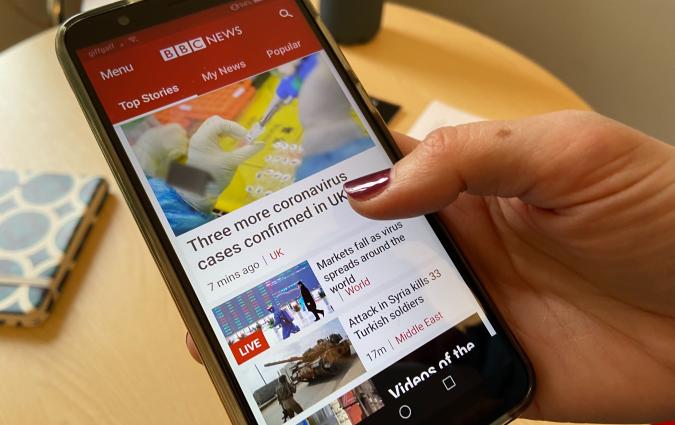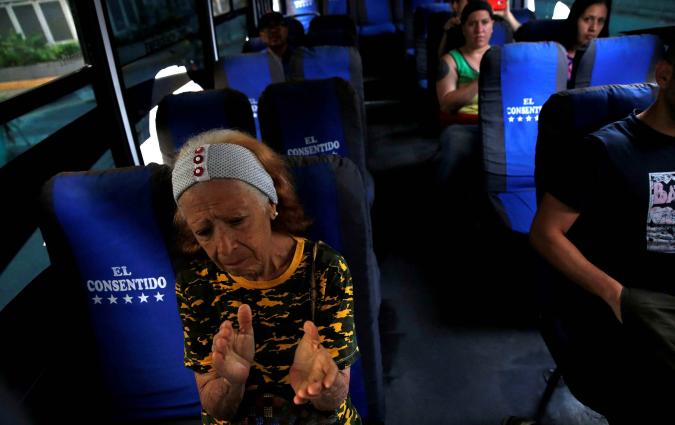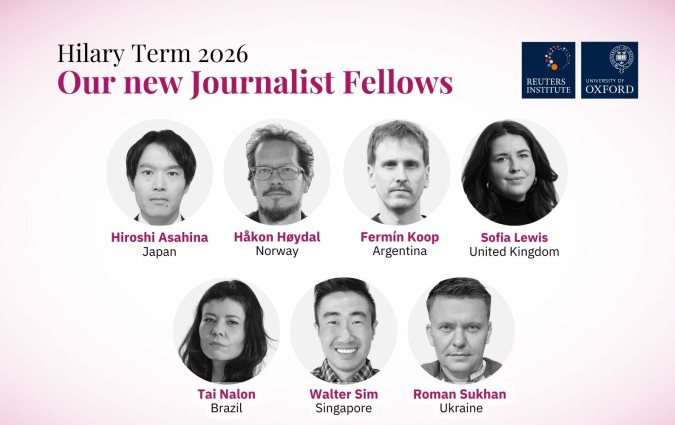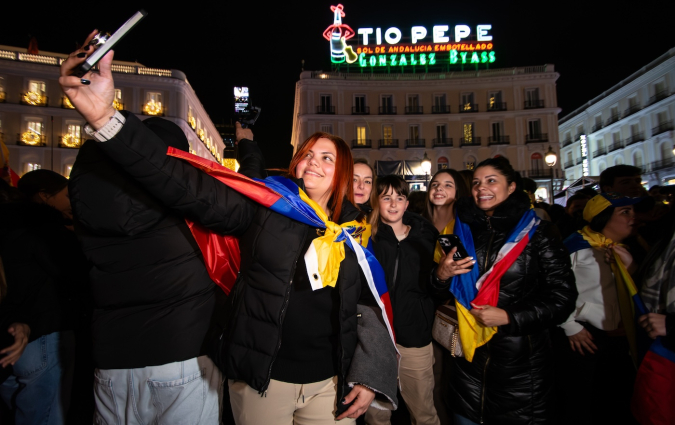A matter of life and death: the dangers of being a journalist in Somalia today
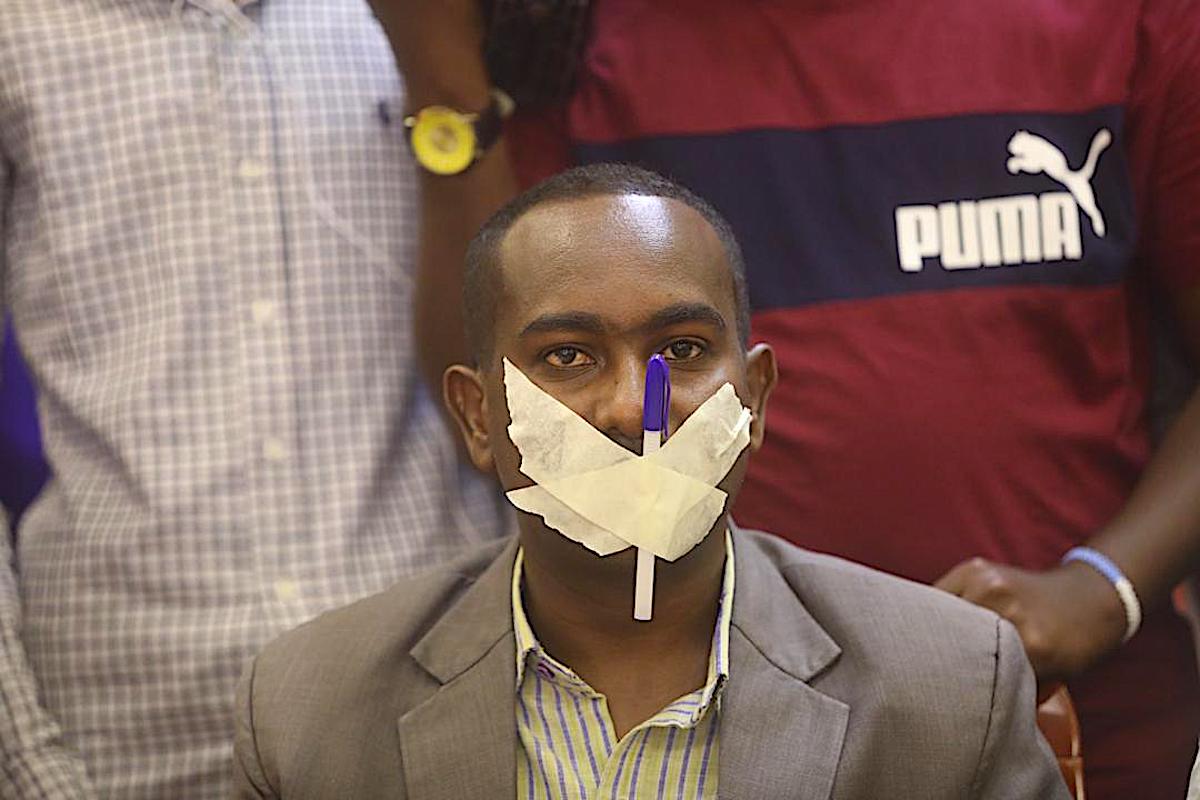
Somali journalist Abdalle Ahmed Mumin during a recent protest.
This piece was updated in March 2023 to reflect the fact that Abdalle Ahmed Mumin was imprisoned by the Somali authorities for disobeying government orders. An update on his situation can be found at the end of the piece.
Journalism is a dangerous job in Somalia. No one knows this better than Abdalle Ahmed Mumin, an accomplished journalist and a press freedom advocate whose work has appeared in The Guardian and The Wall Street Journal. Abdalle's most recent incident occurred just a few weeks ago when agents from the Somali National Intelligence Agency apprehended him at the Aden Adde International Airport in Mogadishu as he was getting ready to fly to Nairobi, Kenya, for medical care.
Abdalle, who’s also the secretary general of the Somali Journalists Syndicate, had cleared the security checks and everything appeared to be going according to plan. However, when he approached the immigration officer, they seized his passport and told him that he could not leave the country.
“Two officers from the agency led me through a backdoor to their airport office,” Abdalle says. “They inquired why I was travelling, and I told them I needed to see a doctor in Nairobi because of my condition. They brought a police van and took me back to the police station.”
Although the officers who arrested him at the airport did not have a warrant for arrest, Abdalle was held incommunicado for two days and his lawyers and family were denied access to him. “It was very unfortunate,” he says. “My lawyers got access on the third day, and when they went to the court to get bail, surprisingly, there were no charges against me.” He was granted bail, but he is not permitted to leave the country to seek medical treatment.
This was the second time he had been arrested in a week. Two days before this incident, Abdalle had been charged and freed on bail by a local court after spending six days in custody. In early December, six press freedom and human rights organisations wrote a letter to Somali authorities asking them to drop any pending criminal charges against Abdalle.
How it all started
On 10 October Abdalle read a joint statement by journalists in a press conference raising concerns about a new directive which had been issued by Somalia’s Information Ministry. The directive “prohibited dissemination of extremism ideology messages, both from official media broadcasts and social media,” and suspended more than 40 social media pages where terrorists “have been spreading their wrong messages and tracking on other media channels”.
Journalists were concerned that the vague wording in the law would limit their ability to report freely on ongoing operations against any armed groups and restrict their media freedoms.
Two days after reading the statement, Abdalle was arrested in the National Intelligence’s underground jail, a place with poor sanitation where the temperatures could go as high as 50ºC. While in jail, he became unwell and needed medical attention.
“I wasn’t given any drinking water because there was none. So sometimes I drank water from the washroom, which was not safe. I could also go for days without drinking water and I developed an allergic reaction and kidney pain.” While Abdalle was in detention, intelligence agents interrogated him constantly about his work as a media advocate.
The most dangerous country in Africa
Somalia is regarded as one of the most dangerous countries in the world for journalists, as they face threats from both government and militant groups like Al-Shabab and a few clan militias.
Somalia ranks 140 out of 180 on the RSF’s Press Freedom Index. According to the organisation, Somali journalists operate in a corrupt and violent environment. More than 50 media workers have been killed since 2010, making Somalia the most dangerous country for journalists in Africa.
These are the issues that prompted Abdalle and other friends to launch the Somali Journalists Syndicate (SJS) in 2019, an independent union dedicated to defending press freedom and the rights of journalists more generally. The organisation provides legal assistance and advocates for access to any public information.
“We felt that there was a gap,” he says, “Most journalists in Somalia were suffering but didn't have anyone to speak for them. When we launched the SJS, people were asking us, ‘what are you doing? How will you survive? How will you do this?’ Everyone was telling us that we would be killed.”
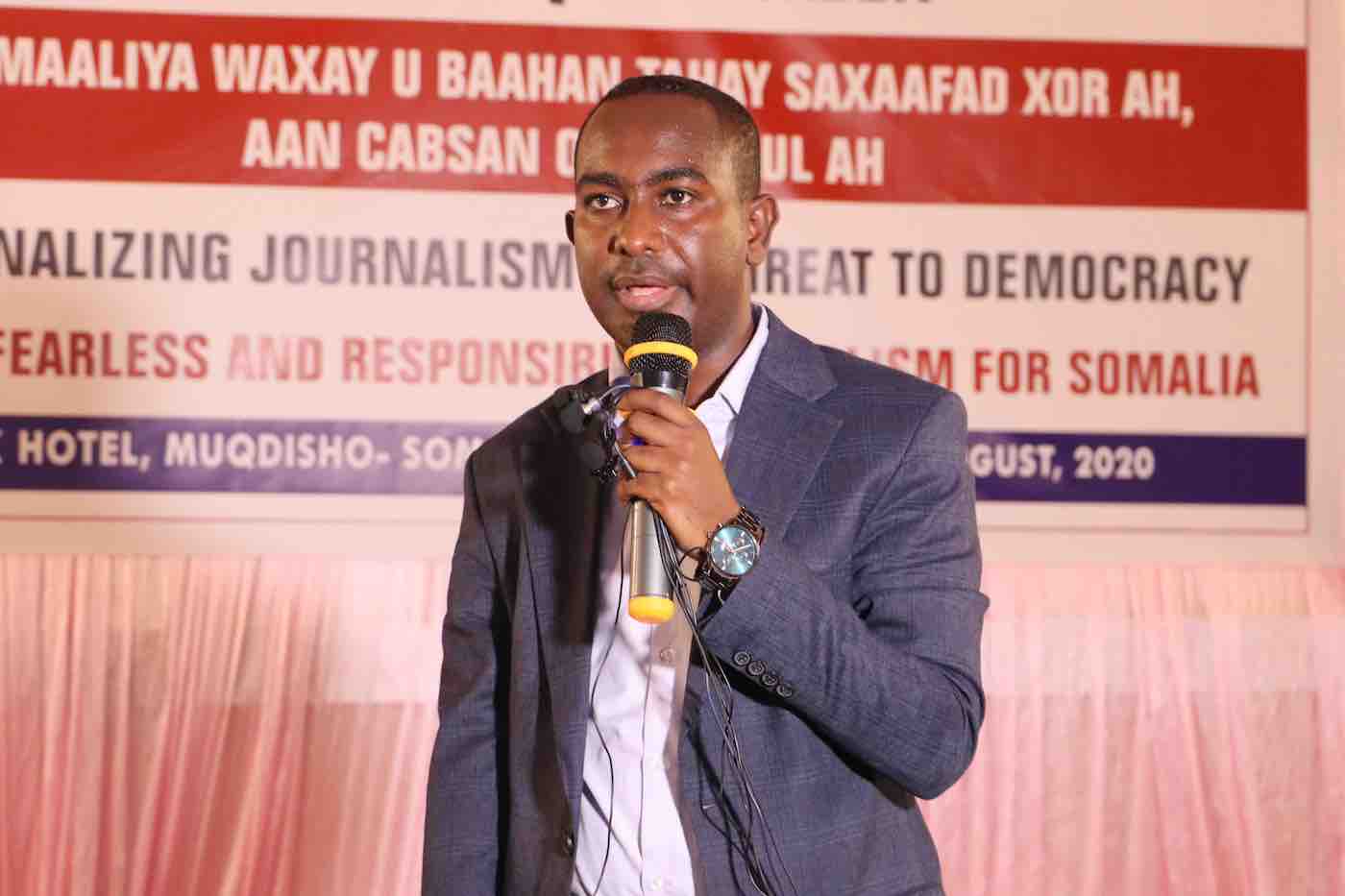
Challenging repressive media laws
In their advocacy for press freedom, the union challenges repressive laws. An example is the new media law passed in 2020 that restricts the activities of media workers and gives the state unrestrained power over news organisations.
According to Amnesty International, the Committee to Protect Journalists, and Human Rights Watch, the law includes provisions that threaten human rights and can criminalise reporting and give the government overly broad powers and oversight over media organisations. “The provisions on criminal penalties are vaguely worded and could give law enforcement authorities wide scope for misinterpretation and abuse,” read a joint statement from these three organisations.
Abdalle has been at the forefront of critiquing the law's implementation, which includes problematic provisions that have been used to arrest journalists. “We still don't have either a freedom of expression law or an access to information law and we are campaigning for that,” he says.
The Somali Journalists Syndicate has grown from around 50 members to more than 500. It includes both full-time employees and freelancers working for local and international media across the country. Legal assistance is not limited to members. When journalists are arrested, they are offered support.
“Whenever a journalist is detained, no one knows about it. He or she might end up in jail for years or months, without anyone noticing it. So we do that advocacy. We issue press statements. We say what we can to condemn it. And we hire lawyers for these journalists to defend them in court,” Abdalle says. The organisation also offers training on safety, human rights coverage, conflict reporting, and gender issues.
Getting into journalism
Somalia has gone through one of the longest conflicts in Africa whose roots date back to 1991. The country’s civil war created a power vacuum in which Islamic groups, warlords and militias battled to seize control of large parts of the country.
Born in the Southern Coast of Somalia, Abdalle moved with his family to Mogadishu to start going to school but that never happened as the civil war broke out. After fleeing from place to place, he and his family ended up in a refugee camp where he started his education.
As he witnessed certain communities being marginalised, women being abused by militiamen and food aid diverted by powerful people, he started to dream about being a journalist. “That was my first impression of my country as a young boy. I felt that the only option was to fight injustice through my education,” he says. “I wanted to be a journalist not to get a good salary but to fight injustice even if it costs me my life.”
While he was still at the camp, Abdalle lost his mother to sickness. Then one afternoon, on their way back from school, he and his younger brother were caught up in a fight between two militias from rival clans. Abdalle’s brother was shot and killed and he lost his right arm. "I had to learn to write and to do everything with my left hand,” he says.
Abdalle got his first job as an intern reporter for a local newspaper in 2002. In 2003, he had to flee to the semi-autonomous Puntland region as the war intensified in Mogadishu. In Puntland, he continued his journey as a journalist switching from print to radio. A few months later, however, the radio station was closed by the region’s warlord and Abdalle started working as a reporter online.
The story that led him to flee
In 2009, local authorities imposed restrictions on journalists covering fighting between government forces and militant groups in the region. One of Abdalle’s colleagues was arrested for interviewing a local militant commandant. While visiting him in jail, Abdalle was shocked at the state of the prison. There was no clean drinking water and some of the prisoners had developed skin diseases. As soon as he left, he wrote an article describing these conditions.
“The president of the region sent the police to my home to arrest me. I learnt about this before they arrived, so I fled from my home and didn’t sleep with my wife and children for a week,” he says.
In Mogadishu, Abdalle continued freelancing and in 2011 he started working with The Guardian and The Wall Street Journal. Working as a reporter for western media exposed him to new criticism as this is considered a betrayal by both the government and militias like Al-Shabab, al Qaeda's affiliate in East Africa.
An attempt on his life
In September 2014, Abdalle received a tip about the death of Al-Shabaab's emir, Ahmed Abdi Godane, who had been wounded in a US airstrike. Then he broke the news through a story for The Wall Street Journal.
After publishing the story, Abdalle started receiving dozens of threatening calls from anonymous people. Terrified, he sneaked out of the country to Kenya, where he stayed for two weeks hoping that the risk would fade away.
After returning to Mogadishu, there was an attempt on his life. He was driving from the bank when he noticed a white vehicle on his tail, with two occupants dressed in the uniform of the security forces. “I had undergone some training on safety, and I immediately suspected the two guys because they tried to overtake me, but I could not let that happen,” he says.
These strangers began shooting at him after failing to overtake him. Two shots hit his vehicle, but he was not hurt. “I drove straight to a local garage, left my vehicle and stayed at a hotel that night. The next morning, I went to Nairobi and that is how my story in exile started,” he explains.
Upsetting the camp ‘gatekeepers’
Militant groups and government officials are not the only ones upset by Abdalle’s news stories. Highlighting corruption and social injustices has displeased others too. In 2019, he investigated and wrote a story about some individuals who were diverting and stealing food aid from vulnerable families in refugee camps.
These individuals are mostly members of powerful clans or associated with government officials and are commonly referred to as ‘gatekeepers’ because they keep the gate of the camps. “If a family receives 50 kilograms of food aid, they will get 25 kilograms and the gatekeepers keep the other 25. Gatekeepers take 50% of everything for no reason. They were just stealing from these powerless women and children. Yet these are people who have big villas in the city,” he says.
When the article was published, Abdalle started receiving threats from ‘gatekeepers’, local authorities, and the mayor of Mogadishu. The threats worsened and he had to flee and seek refuge in Nairobi again.
Fighting to end impunity
Several journalists have been killed in Somalia, yet no one has ever been held accountable. Abdalle and other press freedom defenders are fighting to end that culture of impunity. According to the CPJ’s 2022 Global Impunity Index, Somalia remains the worst offender on the index for the eighth straight year. CPJ’s database of attacks on the press indicates that a total of 89 journalists in Somalia have been affected by various forms of violations between 1992 and 2022: 75 were killed with motive confirmed while 14 have been imprisoned in that period.
“Some journalists were killed by police officers, some by corrupt government officials and by members of the military. Others have been killed by Al-Shabab, criminal groups, clan militia, and corrupt businesspeople. In this country, everyone is armed and this is the kind of risk we face,” he says.
Abdalle has also been labelled as a foreign agent because of his work for western news outlets and because of the support the union receives from international organisations. When a Somali journalist reports for western media, Al-Shabab labels them as a spy for a Western government. The Somali government also views them as agents for foreign countries.
“I was described as a Kenyan agent by the former government because the former president was in a diplomatic row with the Kenyan government. I am just a simple, poor journalist. Sometimes they describe me as pro-Western because I speak for the cause of human rights, but human rights are universal,” he notes.
‘Who will speak for Somali journalists if we don't?’
Abdalle is aware of the risk he constantly faces. “The reason I am doing this is that, if I quit, no one else will take this up. That's why I was targeted. Those who targeted me are well aware that doing so will send a chilling message to others,” he says.
Abdalle and his colleagues feel let down by the silence of the international community. He calls on them to speak out and to stop supporting officials who have attacked journalists and restricted media freedom in Somalia.
“When I say international actors, this includes the United Nations, the European Union, and the African Union,” he says. “These organisations have similar responsibilities towards protecting media freedoms in Somalia and other countries. Unfortunately, what I see is hypocrisy.
An update on Abdalle Ahmed Mumin. March 2023
A couple of months after this piece was originally published, Abdalle Ahmed Mumin was sentenced to two months in prison on 13 February by a local court for disobeying government orders. However, prison officials refused to take him into custody, saying he had already served the prison time according to a copy of the sentence reviewed by the Committee to Protect Journalists (CPJ). However, on 23 February Abdalle was arrested and taken to custody while attending a public meeting convened by a senatorial committee in Mogadishu.
Muthoki Mumo, CPJ’s sub-Saharan Africa representative, says that what is unclear to them is the justification or the reasons given to prison officers to change their stance on his case. She says that according to reports, Abdalle is not doing well due to the prison conditions and health concerns.
“We are calling for his release because first of all, it is unclear the legal basis on which he was arrested on 23 February given the legal limbo that preceded that and the disagreement between the various parts of the government but also because from the very beginning, if you look at what he's been convicted of, he's essentially exercising his freedom of expression,” she says.
Mumo adds that when the government punishes someone like Abdalle for his opinions it has reverberations as he is one of the most outspoken people on matters of press freedom in Somalia.
“If you silence the most outspoken person, what message does it send to young journalists joining the newsroom for the first time or thinking of branching out to cover insecurity issues or do investigations? It sends you a very scary message,” she says.
In every email we send you'll find original reporting, evidence-based insights, online seminars and readings curated from 100s of sources - all in 5 minutes.
- Twice a week
- More than 20,000 people receive it
- Unsubscribe any time


